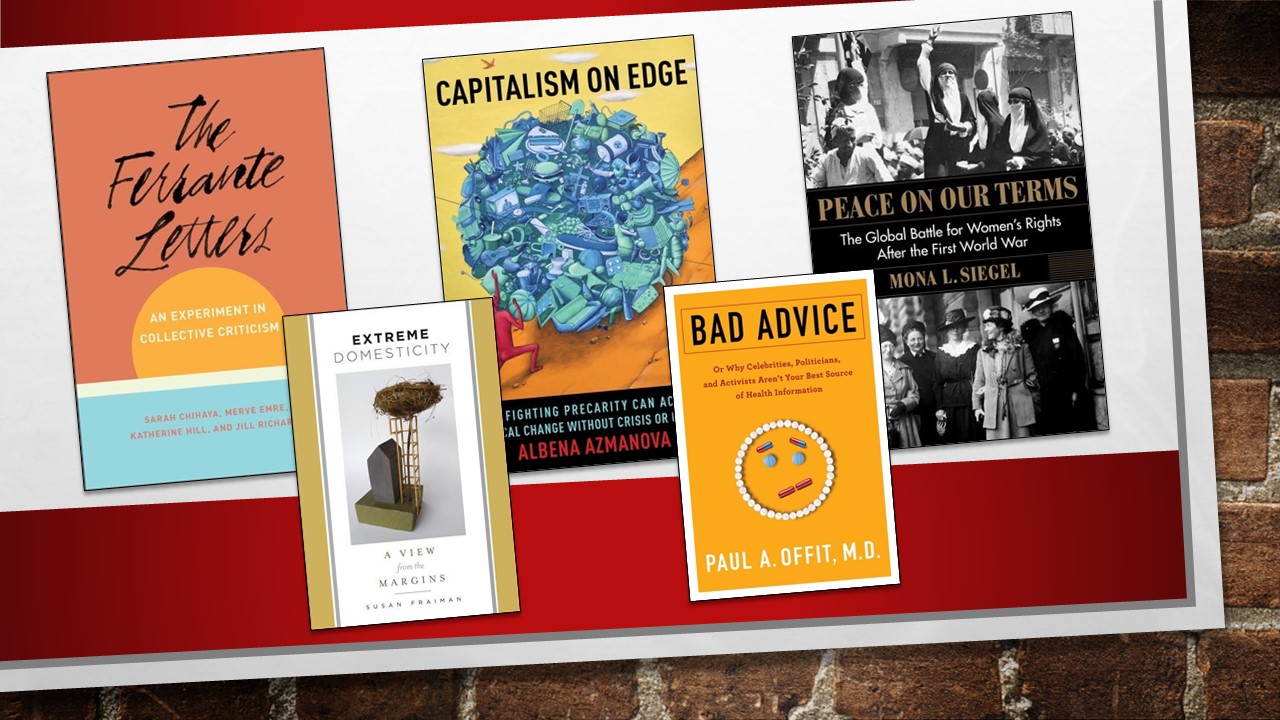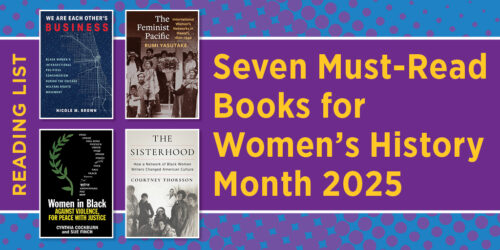Wanting Everything: Tactics, Rights, and Queer/Feminist Care
Jill Richards in conversation with Sangina Patnaik, and Kelly Mee Rich

“The Fury Archives is a tour-de-force study of modernist women’s struggles for citizenship and human rights across transnational geographies. Richards reminds us of the variegated sites and everydayness of politics—from the sphere of reproductive labor to the quotidian committee meeting—and offers a compelling genealogy of the intersections between women’s rights and human rights. It is one of the most nuanced accounts of politics as praxis I have ever read.“
~Janice Ho, author of Nation and Citizenship in the Twentieth-Century British Novel
Our Modern Studies Association virtual exhibit continues with a conversation between Jill Richards, author of the new book The Fury Archives: Female Citizenship, Human Rights, and the International Avant-Gardes, Sangina Patnaik, and Kelly Mee Rich.
• • • • • •
Kelly Mee Rich: At the end of your introduction to the Fury Archives, you note that you don’t turn to the past for lessons, but rather to “sound out” narratives that have been lost, and question those that have become commonsense. Still, I want to hear more about the relation of Fury Archives to our present moment, especially given your own history of activism and work towards bringing about a better future. Of all the narratives you address in your book, which one would you like to see reemerge today? A playful (yet serious!) way of putting this might be: if these archives were able to take hold and unfold, which chapter’s counterfactual future feels the most urgent, or perhaps pleasurable, to contemplate?
Jill Richards: I’ve been thinking a lot about the history of the proletarian birth strike lately, in the wake of the Mothers’ Brigade in Portland’s BLM protests and mutual-aid organizing around Covid-19. In the early twentieth century, for some syndicalist and anarchist groups, the birth strike was imagined as a tactic that could overthrow capitalism, because it would shut off the supply of future proletarian workers. Elizabeth Gurley Flynn writes about it in her manual Sabotage (1916), alongside methods for workers to destroy clothing looms. But the important thing for me about the birth strike is not the militarization of women’s reproduction, but the establishment of unwaged mothers as political subjects with their own coalitional force. The birth strike allowed mothers to organize as workers, and that work was the unwaged labor of childbirth, childrearing, and housekeeping. The birth strike allows us to think beyond the right to privacy so often applied to women’s reproduction and to instead consider collective tactics for equality.
But I’m not saying that there should be another birth strike! Rather, during the past months of Covid, in and amidst the ongoing protests against police violence, I’ve been really struck by the ways that care work can be understood as a tactic for equality, particularly as it moves outside the nuclear family and across racial lines. And I think the proletarian birth strike offers us a model for positioning unwaged women, children, and adolescents as political actors in their own right, as a coalitional force, with their own needs and demands.
Sangina Patnaik: Your shift in emphasis away from human rights towards tactics opens up new methodological terrain for human rights and literary criticism. As you argue, tactics make space for the improvisational, the contradictory, the day-to-day business of surviving within the nation-state whilst imagining a future outside of its constraints. What is it about the tactical that first drew your attention? And have you arrived at a different sense of its possibilities and limitations since writing the book?
Jill Richards: The turn to tactics was a way to wrestle with Wendy Brown’s foundational claim, in States of Injury, that we cannot not want rights. Part of me wanted to frame a narrative against women’s and human rights entirely, beyond the framework of liberal rights, because of the ways those discourses imagined such minimal gains. But when I went to the archives, the language of rights was so often there, as a stated desire, that I couldn’t entirely discount it. It would be possible to criticize those texts as not radical enough. (“Is that all you want?” asks Mina Loy, to the feminist movement demanding the vote.) But I hate that critical posture, that blames historical actors for not knowing what we now know, or not being radical enough to demand everything. So instead of evaluating claims for rights, I tried to understand rights language as a tactic, as speaking in and through the language of the state, in order to approach whatever political gains might be had.
Sangina Patnaik: Care and care work emerge in The Fury Archives as evocative alternatives to sympathy—a concept that has a long history within literary criticism. How does the notion of care make collective belonging imaginable in ways that sympathy might not? And do you think of The Fury Archives as theorizing an “ethics of care” (to borrow your description of Leonora Carrington’s work) outside of emotional demands?
Jill Richards: In many ways, this is my counter to one strand of politicized affect studies that locates agency in positive or negative emotions severed from any prospect of collective action. In my book, I wanted to shift emphasis from how people feel about each other to what they are doing together. For one model of this shift I keep returning to Bernice Johnson Reagon’s 1981 work on coalition politics, which disavows the necessity of friendship, or even fondness, as a precondition for white feminists, lesbians, and women of color to work together. “You don’t go into coalition because you just like it,” says Johnson Reagon. “The only reason you would consider trying to team up with somebody who could possibly kill you, is because that’s the only way you can figure you can stay alive.” For Johnson Reagon, coalition doesn’t mean that material differences between feminists, and the lived antagonisms behind them, disappear: “I ain’t gonna let you live unless you let me live. Now there’s a danger in that, but there’s also the possibility that we can both live—if you can stand it.” I love this deromanticizing of cross-racial feminist/queer coalition, and the way that collective survival, rather than sympathy, becomes the key analytic. Sympathy can create a kind of leveling force, and produce a subject of injury, while this version of coalition is closer to what I call an ethics of care. Here the emphasis lies on collective actions across racial lines for feminist/queer survival, rather than what is often seen as their precondition, feeling with or for an injured subject.
Kelly Mee Rich: Your book is doing such important work in bringing various discursive and disciplinary worlds together, particularly the study of law and gender. Now that the book is out, could you speak more to the challenges and affordances of interdisciplinary work? Were there any paradoxes that emerged for you while putting these fields in conversation with each other?
Jill Richards: When I was writing The Fury Archives, I was often frustrated about the knottiness of the political history. I would wish that all the anarcho-syndicalist feminists, anticolonial activists, and Black radicals would stay on one side and then the liberal rights discourses, through the League of Nations to the UN, would stay on the other. That would have been an easier historical story to tell, in part because my work is very inflected by critical legal theory, which often points to the limitations of liberal rights discourses. One cartoonish version of this divide goes: radical politics is about action on the ground to revolutionize our social system and liberal politics is about voting for rights within the existing system. That is a useful conceptual rubric, but if you are looking at a longer history or at literary texts, people don’t always stay on their own side. Especially if you are looking at language use, about the languages for freedom, say, things get a little knottier.
In the late nineteenth and early twentieth centuries, some of the most radical political formations, aesthetically and politically, often used the language of rights, and human rights in particular. It was a moment when there was a plasticity to the language of human rights, before they had calcified into a diplomatic tool for multinational institutions. This plasticity is behind the 1951 petition, We Charge Genocide, which I see as a tactical document that repositions lynching in America as an international human rights violation and appeals to the sovereignty of the United Nations.
I am not interested in defending liberal rights; really I’m interested in how they got used as a feminist tactic, often for demands that were much more radical, bizarre, or profane. This speaks to your question about interdisciplinary work: it signals an approach to the law that is less about what turns into legal doctrine, and more about how people might appropriate legal mechanisms, purposely misuse or evade them, for entirely different political futures.
Kelly Mee Rich: Part of what I admire about your work is the way you draw our attention to little-known texts, figures, and events in order to unsettle received histories and accounts of human rights and the avant-garde. Can you give us a glimpse into the way you navigate these archives? And do you see The Fury Archives as offering a theory of the archive, whether overtly, or through the specific work that it does?
Jill Richards: Theories of the archive often boil down to a question of selection—what is chosen or preserved as important, to make it into the capital-A archive, as a historical referent for the way that we understand the past. I wanted to tell a story about feminist history that was less about the reformist gains we associate with first-wave feminism, like the vote, and more about the daily life of feminist action in the street, the home, or the factory. Which archive you choose to highlight is in itself an argument about this historical perspective. It is the centennial of women’s suffrage in the United States and we keep hearing about Elizabeth Cady Stanton and Susan B. Anthony. What if the centennial focused instead on the way that the suffragettes employed what was then understood as a new “Russian” tactic, the hunger strike, to leverage their own health against the power of the state? In my book I include women’s prison force-feeding logs, which are massive. In many cases the procedure was botched and the food went into the lungs, causing pneumonia. Hunger-striking prisoners were tortured by vaginal and rectal force-feeding. It is a gruesome archive, but my point is about which archive makes for historical narrative. Rather than focus on the political gain that was partial voting reform for women, I want a feminist history that celebrates the tactics that were a part of this movement—the prison hunger strikes and the riots and arson campaigns—as collective direct actions that sought out a different kind of world.
Sangina Patnaik is assistant professor of English literature at Swarthmore College. She teaches and researches in global modernism, critical legal studies, and human rights. She is currently working on a book project entitled What We Owe: Reparations, Human Rights, and Twentieth-Century Literature, which explores narrative forms of accounting for violence.
Kelly Mee Rich is associate professor of English literature at Harvard University. Her research and teaching interests include the twentieth- and twenty-first century novel, law and the humanities, wars and their afterlives, and transnational kinship. She is currently working on her book manuscript, States of Repair: Imagining Welfare in the Postwar British and Anglophone Novel, which studies Britain’s transition from warfare to welfare and its influence on the literary imagination.
Jill Richards is assistant professor of English and affiliated faculty in Gender, Women, and Sexuality Studies at Yale University. She is the author of The Fury Archives: Female Citizenship, Human Rights, and the International Avant-Gardes (2020) and coauthor of The Ferrante Letters: An Experiment in Collective Criticism (2020).
Save 20% on this and all MSA featured titles when you used discount code MSA20 at checkout now through October 31.







